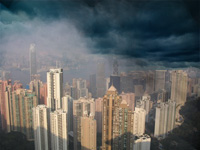Hong Kong's Silent Epidemic
 GLOBE-Net - An independent public policy think tank has released the findings of a 1,020-person public opinion survey that explored attitudes towards air pollution and associated health risks in Hong Kong. The survey results suggest one in five Hong Kong residents are prepared to leave the city because of its poor air quality.
GLOBE-Net - An independent public policy think tank has released the findings of a 1,020-person public opinion survey that explored attitudes towards air pollution and associated health risks in Hong Kong. The survey results suggest one in five Hong Kong residents are prepared to leave the city because of its poor air quality.According to the survey conducted by Professor Michael DeGolyer, Director of Baptist University’s Hong Kong Transition Project, these findings equate to 1.4 million residents thinking about moving away, including 500,000 who are seriously considering or already planning to move according to the survey conducted for the think tank Civic Exchange.
Those most seriously thinking about leaving include top earners and highly educated workers, raising fears about the city’s ability to attract and retain top talent. And other cities in Asia, particularly Singapore, would love to attract those who choose to leave Hong Kong, noted DeGolyer, referring to the long-standing rivalry between the two Asian cities to attract top talent.
Professor DeGolyer highlighted four key findings from the survey:
- Public concern about air pollution rose dramatically between 2001 and 2008. This corresponds with a sharp drop in the proportion of those responding “don’t know” to environmental questions;
- All sectors and segments of Hong Kong society are concerned about air quality;
- Hong Kong people believe air pollution makes Hong Kong an undesirable location for both locals and prospective international talent to work there; and
- Hong Kong people believe air pollution is damaging their quality of life.
“People from all sectors of society know that air pollution is making them sick. Many are concerned to the point that they are considering leaving Hong Kong, including local professionals,” he explained.

However, almost no-one is expressing their concerns to government leaders, members of the legislature, or members of the media, noted DeGolyer. This silence indicates a serious breakdown in communication and trust, and a need to review the public consultation system, according to the survey findings.
This reluctance to speak out is at the root of Hong Kong’s Silent Epidemic says Christine Loh, CEO, Civic Exchange. “This survey presents the voice of the “silent” public - and it is a worried voice.” She hopes these findings can be used constructively to inform the government’s Air Quality Objectives consultation and an upcoming debate on air pollution issues.
The survey also debunked the myth that concerns about air pollution were confined to the city’s foreign residents, as only three percent of the respondents were expatriates.
Air pollution across Hong Kong last year reached its highest level since records began according to official figures released last week, although the Hong Kong government insisted improvements had been made with respect to air quality.
The pollution is mainly caused by huge numbers of factories over the border in southern China, as well as transport and coal-fired power generation in Hong Kong.
Another Civic Exchange report last year said that at least 10,000 deaths were caused every year in Hong Kong, Macau and southern China by the region’s worsening air pollution.
Hong Kong Chief Executive Donald Tsang has called improving air quality a ’matter of life and death’ for the city. “The quality of Hong Kong’s air is of deep concern in the community and the Environment Bureau (ENB) and Environmental Protection Department (EPD) have been working vigorously to achieve improvements,” notes the government’s website.

“In 2007, we continued to reduce air pollution emissions, although it can be hard to see the results when regional pollutants combine into smog. Roadside levels of nitrogen oxides (NOx) have fallen by 24 per cent since 1999 and suspended air particulates (RSPs) by 15 per cent as a result of the government’s aggressive measures to control motor vehicle emissions, it adds.
To bring the message home about the impact of Hong Kong’s poor air quality a new Environmental Index has been set up and made public on the World Wide Web. “The purpose of the newly created Hedley Environmental Index is to make information on the risks to public health arising from air pollution available to the whole community,” said Dr. Hak-Kan Lai of the School of Public Health of Hong Kong University.
“By comparing the community-wide health impacts the Index shows with the specific complaints reported by members of the public shown in the Civic Exchange survey, it is clear that Hong Kong people feel the negative impacts of air pollution deeply.”
You can return to the main Market News page, or press the Back button on your browser.


